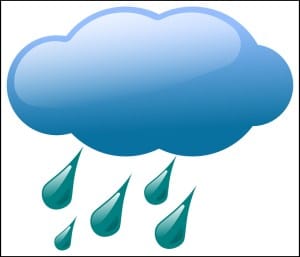More than doubling of stormwater fee OK’d by Monroe County commissioners, to appear on May property tax bills

Last Wednesday, at their regular meeting, Monroe County commissioners approved an increase for the base rate of the county’s annual stormwater fee, from $35.16 to $75.77.
The decision to raise the fee came after a hearing held by the county’s stormwater management board in December, and after approval by the county council on Monday, two days before the commissioners met.
The county’s stormwater infrastructure includes 800 culverts and 1,500 miles of roadside ditches, according to Kelsey Thetonia, who’s the MS4 coordinator for the county. (MS4 stands for municipal separate storm sewer systems.)
When Thetonia briefed county councilors on the proposed increase in late February, she described the range of programs that the county is required to operate under state and federal regulations like the Clean Water Act. They include: public education, outreach, and involvement; detection and elimination of illicit discharge; control of construction site runoff; and prevention of pollution from municipal operations.
The stormwater fee helps to pay for the operation of those programs. It applies to property in unincorporated areas of Monroe County.
The base rate for an equivalent residential unit (ERU) is the flat fee paid by all residential property owners, based on the average amount of impervious surface for a single-family residential property in the county, which is 5,200 square feet. The average amount of impervious surface area was calculated based on digital orthogonally-rectified aerial photography.
The fee for a commercial property’s impervious surface is calculated based on its fraction of an ERU (5,200 square feet).
In early February, commissioners enacted an ordinance change to bring the county’s law on stormwater fees into alignment with the state statute. The state statute requires approval of fees from the fiscal body—that is, the county council.
Objections among county councilors included the size of the fee increase, which was more than double the existing fee, even if the resulting annual fee of $75.77 for a residential property owner still leaves Monroe County in the middle of the pack.
The fact that the fee had not been raised at all since the original stormwater ordinance was enacted around eight years ago, was one consideration that helped councilors towards supporting the increase.
But the time crunch for enactment now, with no opportunity to devise a way to spread out the increase over time, was a source of discontent for more than one county councilor.
The time crunch was driven by the timeline that had to be followed, in order for the increase to appear on the May tax bills. County attorney Margie Rice told councilors they would need to approve the increase on or before March 2, in order to allow all of the steps that are necessary for the auditor, and the treasurer to do their work to get the stormwater fee onto the May tax bill.
Councilor Cheryl Munson indicated at the county council’s March 1 meeting that even with the tax-bill timeline, the council might have been able to come up with an alternative plan: “We had plenty of time to to review this as a council and to discuss other options if we wanted to. I just hope in the future that we can do our jobs better by being provided information earlier, so that our backs are not up against the wall.”
Munson added, “I feel very constrained by this proceeding. And I think it should be known to the public.”
At the council’s late February meeting on the topic Munson said she initially wanted to recommend that half of the stormwater fee be applied this year, and then half the next year, to spread it out a bit. But based on the new state stormwater program requirements, she did not think a delay made a lot of sense. “We need the money now,” Munson said.
Councilor Marty Hawk’s dissatisfaction with the council’s lack of flexibility to come up with an alternative led her to vote against the fee increase. Hawk’s was the sole vote of dissent. Hawk said at the council’s March 1 meeting, that she did not realize there would not be an opportunity for the county council to amend the proposed increase.
Hawk said she thought the council would be able to make a kind of “counter offer.” About the idea of working against a tight deadline, Hawk said, “That’s not the way we should be doing our business.”
County council president Eric Spoonmore said, “I wish we would have had a little bit more time to come up with maybe a solution as Ms.Hawk mentioned earlier. But it is what it is. This is what we have to vote on tonight. And I will be supporting it.”
If the increased stormwater fee is to be included in May tax bills, does that mean it’s actually a tax? No.
At Wednesday’s meeting of the county commissioners, county attorney David Schilling responded to a question about the attributes of the stormwater fee that made it distinguishable from a tax.
A couple of years ago, Schilling said, the Indiana tax court found that flat stormwater fees should be analyzed as a tax instead of a fee: “While a property owner may request an adjustment to the charge, there is no indication that he can decline to use the service altogether or control the extent to which the service is used. Accordingly, the Town’s stormwater charge is a compulsory charge.”
That made the stormwater charge a tax, under the tax court’s ruling.
But in 2019, the state legislature adopted a law that simply defines stormwater charges as fees under state law and not a tax.
In the state of Indiana, it’s a distinction with a difference, because taxes affect the application of so-called “circuit-breakers.”
Circuit breakers are caps on the amount of taxes a property owner has to pay expressed as a percentage of the property’s gross assessed value.




Comments ()